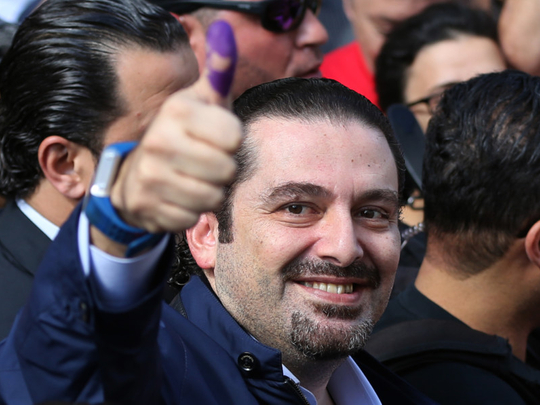
Beirut: Former Prime Minister Sa‘ad Hariri emphasised on Wednesday evening that the Lebanese are “keen on their Arab identity” and that they will not “betray their brothers, especially [those in] the Kingdom of Saudi Arabia”. He reiterated the Future Movement’s project as one that upheld the “State” and only the State, while Lebanese Forces leader Samir Geagea reiterated his party’s rejection to forge a new Doha agreement because, he underscored, such a move would be “destructive”.
If Lebanon’s Arab identity was questionable before 1943 when the National Pact settled the matter, it took two civil wars — 1958 and again between 1975-1990 — to recalibrate the phenomenon.
The 1989 Ta’if Accords resolved the concern once and for all, as the updated Constitution prohibited any “authority or policy that negates the covenant of mutual coexistence among all Lebanese sects”, although it was increasingly clear that those who opposed Ta’if wanted nothing more than to dominate the entire country.
Speaking at the Rafik Hariri University in Mechref — in honour of families from Iqlim Al Kharroub — on Wednesday evening, Hariri said moderation and the rejection of sectarian sedition were his priorities. “We are the movement that is keen on Lebanon’s Arab identity,” he declared, and “we will stand in the face of any scheme aimed at undermining Lebanon’s ties with its Arab brothers ... We reject any Iranian hegemony over Lebanon’s domestic and foreign policies,” he added, in words that were primarily addressed to Hassan Nasrallah.
Hariri’s words were especially poignant because Hezbollah scorned Ta’if and wanted, instead, a Thulathiyyah [Trisection] that would divide power into three equal parts, one for Christians, another for Sunnis and a third for Shiites.
The LF’s Geagea revisited the theme in an interview with the Kuwaiti Al Ra’i newspaper, in which he pounded that “any attempt to call for a new Doha Accord to introduce system changes in favour of a certain Lebanese group at the expense of another would be unacceptable and destructive, regardless whether it comes amid peaceful circumstances or after a security unrest”.
This was a clear warning to Speaker Nabih Berri who floated the idea earlier, as Geagea insisted it was Hezbollah that “obstructed the presidential elections,” which he claimed was “confirmed after our nomination of (Free Patriotic Movement founder) General Michel Aoun.” Geagea pledged to persuade the Future Movement to back the election of Aoun as “the only way to end the presidential deadlock,” although Hariri stood by the Marada Movement chief Sulaiman Franjieh’s candidacy.
The Doha Accord was an agreement reached by rival Lebanese factions on May 21, 2008, that marked the end of an 18-months-long political crisis, and involved the election of a consensus president, the formation of a national unity government, and holding parliamentary elections under an amended version of the 1960 electoral law.












